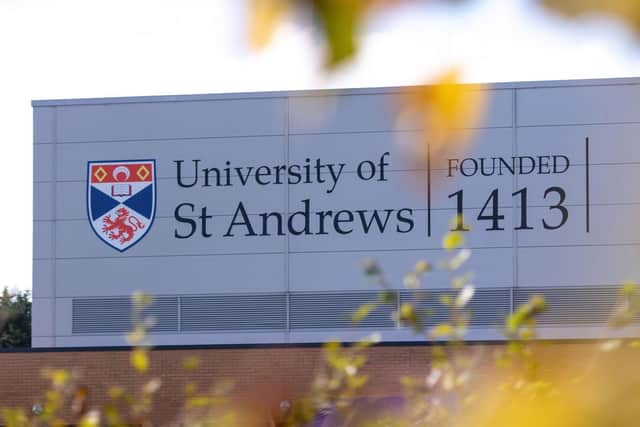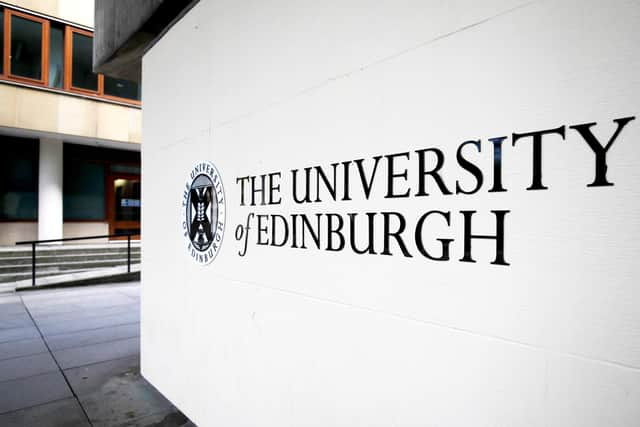Exclusive:Edinburgh and St Andrews universities 'more likely' to offer places to foreign students than Scots in most subjects
International students are more likely than Scots to be offered places to study in most subject areas at the nation’s top universities, it can be revealed.
An investigation by The Scotsman found the majority of schools and departments at Edinburgh and St Andrews universities made a higher rate of offers to prospective undergraduates from overseas in 2023, compared to those from Scotland.
Advertisement
Hide AdAdvertisement
Hide AdIt comes amid fresh scrutiny of a controversial Scottish Government cap on the number of Scots who can attend universities north of the border.


At Edinburgh, the offer rate – the percentage of applications which result in an offer – is higher for international students in almost three-quarters of arts, humanities and social sciences courses, including nearly every subject area at Edinburgh College of Art and the School of History, Classics and Archaeology.
And international students, who pay annual fees of up to £35,000, were twice as likely as middle-class Scots to be offered a place on more than a dozen courses at Edinburgh.
The gaps in specific subject areas were not as wide at St Andrews University compared to Edinburgh. However, a breakdown shows fee-payers from abroad still enjoyed a higher offer rate in 16 out of 22 schools or departments at St Andrews.
The figures do not mean international students are always given more places than Scots in these subjects and, at both universities, a similar proportion of applications from Scottish and overseas students received an offer overall last year.


Edinburgh University said overseas students are often less likely to accept an offer in comparison to Scottish students, and insisted the number of offers and acceptances from international applicants has “no bearing” on the number of places for Scots, which are capped.
However, the data shows a large proportion of Scots are not receiving offers in many subjects at the university, at a time of renewed debate over the impact of the cap on Scottish student numbers, which is imposed to limit the cost of the SNP’s free tuition policy.
It also comes in the wake of a Sunday Times investigation last month that claimed fee-paying international students with lower grades were being recruited by the UK’s top universities using “back door” routes.
Advertisement
Hide AdAdvertisement
Hide AdIn Scotland, many institutions have become increasingly reliant on fees from overseas students to help cover real-terms cuts to their government teaching grants for the tuition of Scottish students.


Under the funding system, universities have an overall target for Scottish student numbers, but not for specific subjects, other than “controlled” courses such as medicine, dentistry, teaching and nursing.
Edinburgh University says it aims to have a student community that is roughly one third Scottish, one third international and one third from elsewhere in the UK. In 2023, it had 69,377 undergraduate applications, with 27,608 offers being made – a rate of 40 per cent – leading to 6,409 acceptances.
However, The Scotsman found international students were far more likely to receive an offer for a place in most courses run by the College of Arts, Humanities and Social Sciences, which is one of three colleges at the university.
A total of 46 of the 64 subject areas in the college had a higher offer rate for overseas applications when compared to those from Scotland in 2023. Scottish applications had a higher offer rate in just 15 of the 64 subjects, with the other three unable to be calculated due to the low numbers involved.
In nine of the subject areas, the offer rate for international applications was at least double that for Scottish students. These were Art, Design and Technology, History Joint, History and Politics, History of Art, History of Art Joint, International Business, Philosophy and Politics, Sport and Recreation Management.
The Design and Technology subject area at Edinburgh College of Art is one of the most popular, with more than 4,400 applications last year.
However, despite similar numbers applying, statistics show 25 per cent of the applications from overseas students were met with an offer, compared to 10 per cent of Scottish applications and 11 per cent from the rest of the UK.
Advertisement
Hide AdAdvertisement
Hide AdIn the end, 78 places went to international applicants, 67 were from the rest of the UK and 54 from Scotland. In History of Art, a total of 86 per cent of applications from overseas received an offer, falling to 63 per cent for applications from the rest of the UK, and 27 per cent from Scotland.
In degrees where History is “joint” with another subject, exactly the same number of applications were received from international students as Scottish ones in 2023. Offers were made to 79 per cent of the 135 applications from overseas, but only 31 per cent of the 135 applications from Scots.
The proportion falls even further to 13 per cent if only Scots who do not have a “widening access flag” are included, meaning they are not prioritised because they do not meet certain criteria designed to encourage more people from disadvantaged backgrounds into higher education.
While there are nine courses where international students are twice as likely as Scots generally to be given an offer, the number rises to 13 for middle-class Scottish students who do not have a “flag”, with the addition of Archaeology, International Relations, Music and Politics.
There was also a significant gulf in offers at Edinburgh in Fine Art, Classics, History, Social Anthropology, Philosophy, and Philosophy and Psychology. In Law, 41 per cent of applications from overseas received an offer, compared to 24 per cent from Scots, and 14 per cent for Scottish students without a “flag”.
An analysis of applications for all three colleges at Edinburgh University shows the offer rate was higher than 80 per cent for international students in 12 subject areas, compared to four for Scottish applications.
Dr Shane Collins, Edinburgh University’s director of student recruitment and admissions, said entry to the university was “highly competitive”. He said: “The number of places we offer to international students has no bearing on the number of places available to students from Scotland or the rest of the UK.
“Like other universities, we assign applicants a separate fee status depending on whether they are from Scotland, the rest of the UK or overseas, and applicants are only in competition with those who have the same fee status.
Advertisement
Hide AdAdvertisement
Hide Ad"All students who come to study with us are well qualified and must meet the minimum entry requirements for their chosen degree programme, to ensure they have the right skills and knowledge to succeed.
“For all fee groups, we make more offers than we have places for. This is because not all students will accept our offer and, even when they do, not all students will turn up to matriculate at the start of their degree programme. This is particularly pronounced for international students, who may be holding multiple offers from universities across the world."
A St Andrews University spokesperson said: “The Scottish Government caps the number of Scottish students universities are able to admit each year, and that phenomenon alone determines the number of offers we and others are able to make to Scottish applicants.
“For that reason, offer rates will vary between Scottish, rest of UK and overseas student cohorts applying to Scottish universities. The tariffs for entry to St Andrews are amongst the highest in the world, and successful overseas applicants will have only top grades and a demonstrated ability to meet the highest academic standards.
"The University of St Andrews receives thousands of applications every year from around the world, but only one overseas student will be admitted for every ten who apply.”
A Scottish Government spokesperson said the number of international students being accepted at Scottish universities had fallen in recent years. The spokesperson added: “The latest UCAS [Universities and Colleges Admissions Service] data shows that 35,320 Scottish domiciled students were accepted to study at Scottish universities in 2023, which accounted for around 76 per cent of all acceptances that year. This includes a record number of young people aged 19 and under.”
Comments
Want to join the conversation? Please or to comment on this article.
